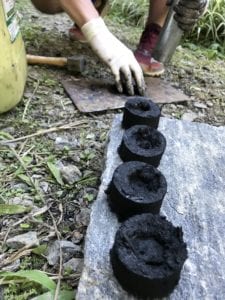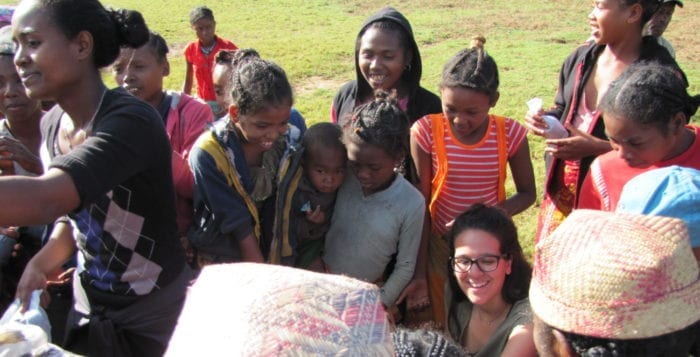By Daniel Dunaief
Leila Esmailzada set out to change the world but first had to perform a task that turns many people’s stomachs: clean someone else’s vomit off the floor.
The Stony Brook University graduate student, who is in the master’s Program in Public Health, traveled to Madagascar for a second consecutive summer with the nonprofit BeLocal Group to help several teams of student engineers put into place projects designed to improve the lives of the Malagasy people.
Before they could help anyone else, however, these students, many of them recent graduates from the College of Engineering, fought off a series of viruses, including a particularly painful stomach bug.
Esmailzada said she saw cleaning the vomit off the floor as part of the big picture.
“Compassion really plays into being abroad for your work and for your team, because you realize that everybody came here for a shared mission,” Esmailzada said. “What happens along the way is sometimes just a result of the path that brought them here.”

Indeed, beyond Esmailzada’s compassion, her ability to continue to accomplish tasks in the face of unexpected and potentially insurmountable obstacles encouraged BeLocal, a group started by Laurel Hollow residents Mickie and Jeff Nagel and Eric Bergerson, to ask her to become the group’s first executive director.
“I can’t say enough about [Esmailzada] being so resourceful over there,” said Mickie Nagel, who visited the island nation of Madagascar the last two years with Esmailzada. “She thinks about things in a different way. You can have the best product, but if you can’t connect it to the Malagasy and understand more deeply what they need, what their concerns or wants are” the project won’t be effective.
This past summer BeLocal tried to create two engineering design innovations that had originated from senior projects at SBU. In one of them, the engineers had designed a Da Vinci bridge, borrowing a model from the famous inventor, to help villagers cross a stream on their way to the market or to school. When the makeshift bridge constructed from a log or tree got washed away or cracked, the residents found it difficult to get perishable products to the market.
The first challenge the group faced was the lack of available bamboo, which they thought they had secured months before their visit.
“When the bamboo wasn’t delivered, I figured we were now going to do research on bamboo,” Nagel explained in an email, reflecting the group’s need to react, or, as she suggests, pivot, to another approach.
When they finally got bamboo, they learned that it was cut from the periphery of a patch of bamboo that borders on a national park. Government officials confiscated the bamboo before it reached BeLocal.
“We were happy to see that law enforcement recognized and acted on the ‘gray area rules’ of conserving the national park, which shows that the hard work Madagascar is putting into conservation is actually paying off,” Esmailzada said. She eventually found another provider who could deliver the necessary bamboo a few days later. This time, an important material was cut down from a local farm.
While they had the bamboo, they didn’t know how to cure it to prepare it for construction. Uncured, the bamboo could have become a soggy and structural mess. “We did try to cure [it] a few different ways, but we really didn’t have the time needed to properly treat all of it,” Nagel said. “We didn’t anticipate the bamboo not arriving cured since it was what we had been working on for months.”
Nagel credits the bridge team with adjusting to the new circumstances, constructing two girder bridges over creeks for more market research.
The BeLocal team also worked on a project to create briquettes that are healthier than the firewood the Malagasy now use for cooking. The wood produces considerable smoke, which has led to respiratory diseases and infections for people who breathe it in when they cook.
The group produced briquettes toward the end of their summer trip and presented their technique to an audience of about 120 locals, which reflected the interest the Malagasy had shown in the process during its development.
This fall, BeLocal is working on ways to move forward with sharing the briquette technique, which they hope to refine before the new year. BeLocal wants to develop clubs at Stony Brook and at the University of Fianarantsoa in Madagascar that can work together.
While BeLocal will continue to share senior design ideas on its website (www.belocalgrp.com) with interested engineers, the group is focusing its energy on perfecting the briquettes and getting them to people’s homes in Madagascar.
Nagel admired Esmailzada’s approach to the work and to the people in Madagascar.
Esmailzada said she studied how people in Madagascar interact and tried to learn from that, before approaching them with a product or process. She believes it’s important to consider the cultural boundaries when navigating the BeLocal projects, realizing that “you are not the first priority in a lot of these villagers’ lives in general. You have to understand they won’t meet and speak with you. It’s a reasonable expectation to ask maybe three times for something before you think you can get it done.”
Esmailzada also developed a routine that allowed her to shift from one potential project to another, depending on what was manageable at any given time.
The Stony Brook graduate student is delighted to be an ongoing part of the BeLocal effort.
“I love working with an organization that has the passion and vision as large as BeLocal,” she explained. “This work is fulfilling because you are working toward the chance of improving the well-being of another person or community.”





